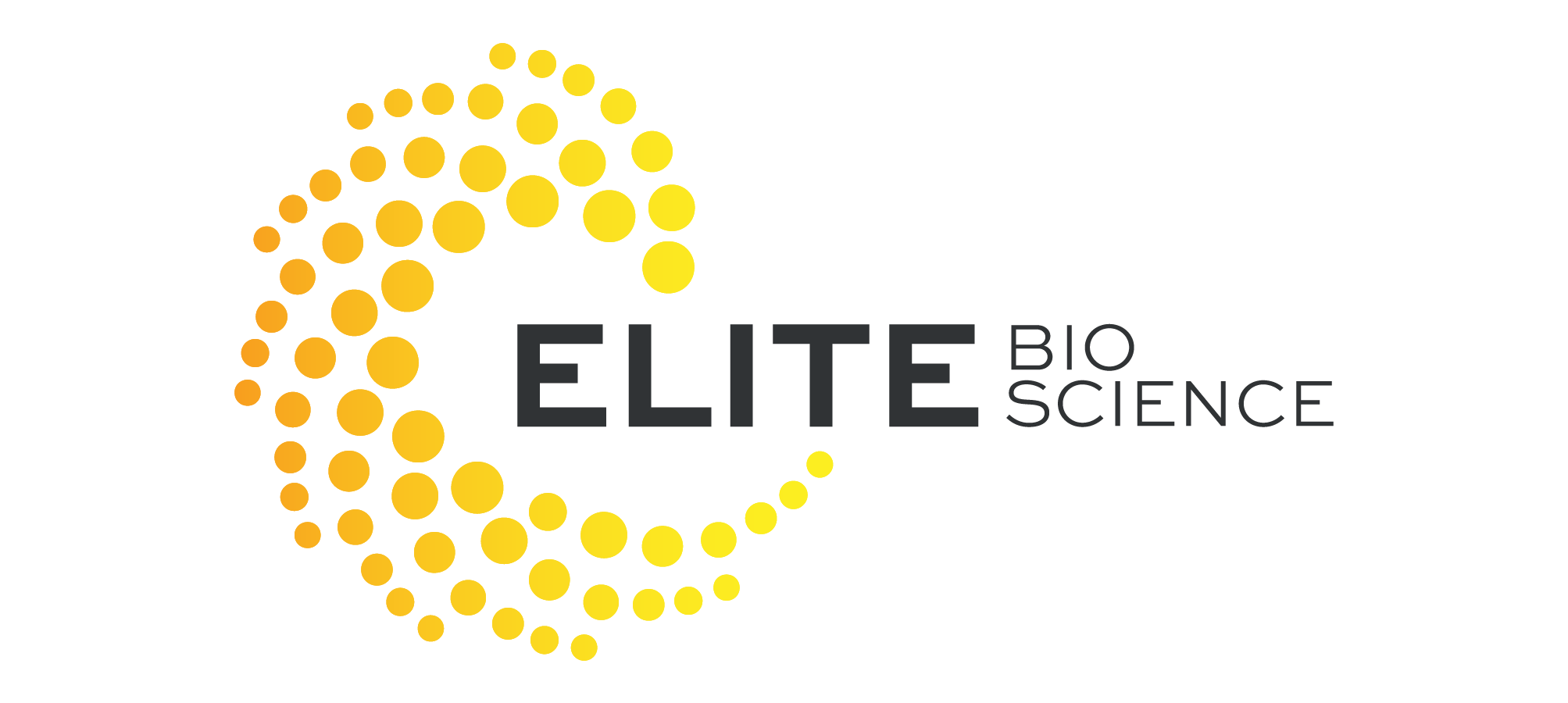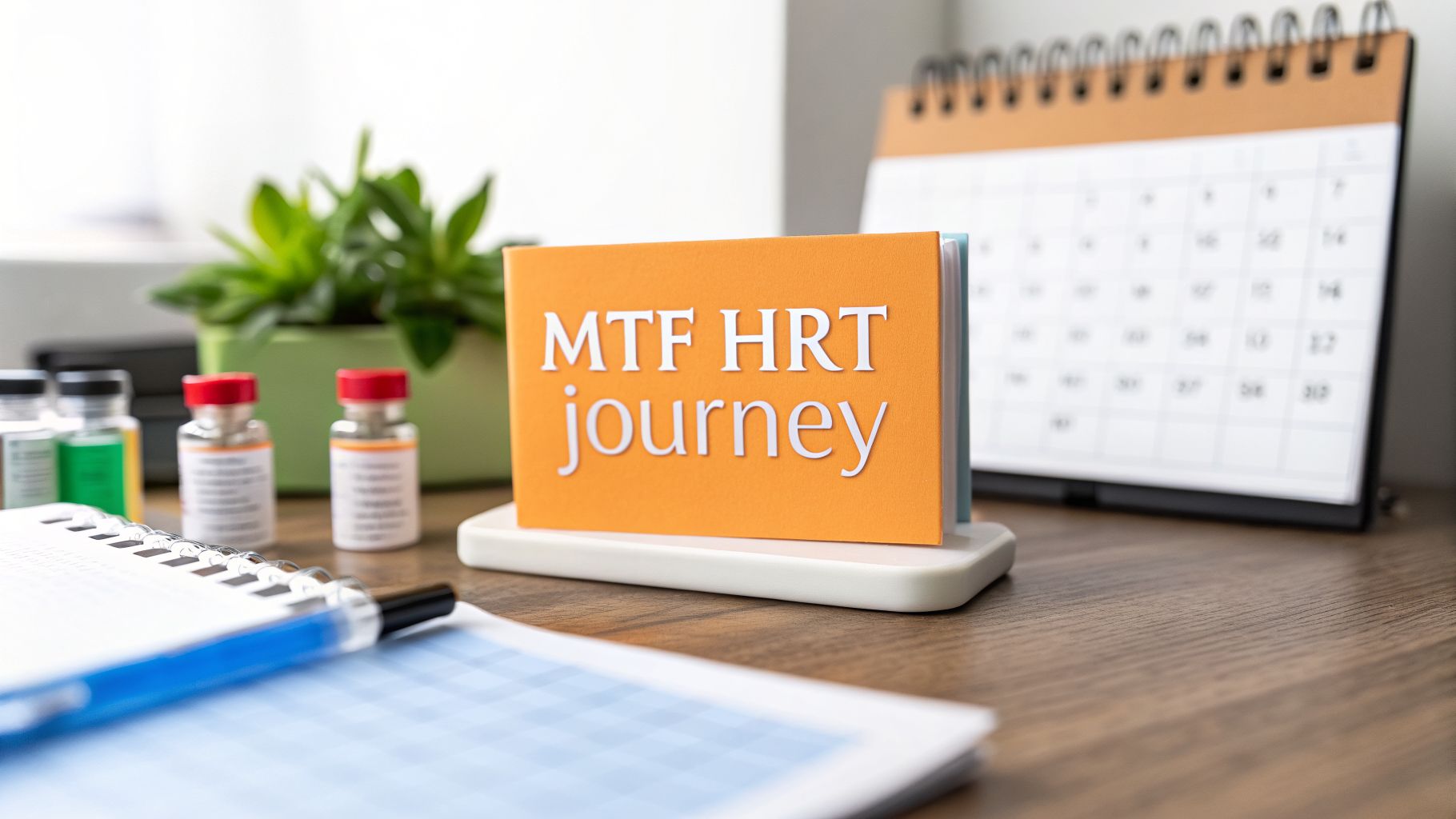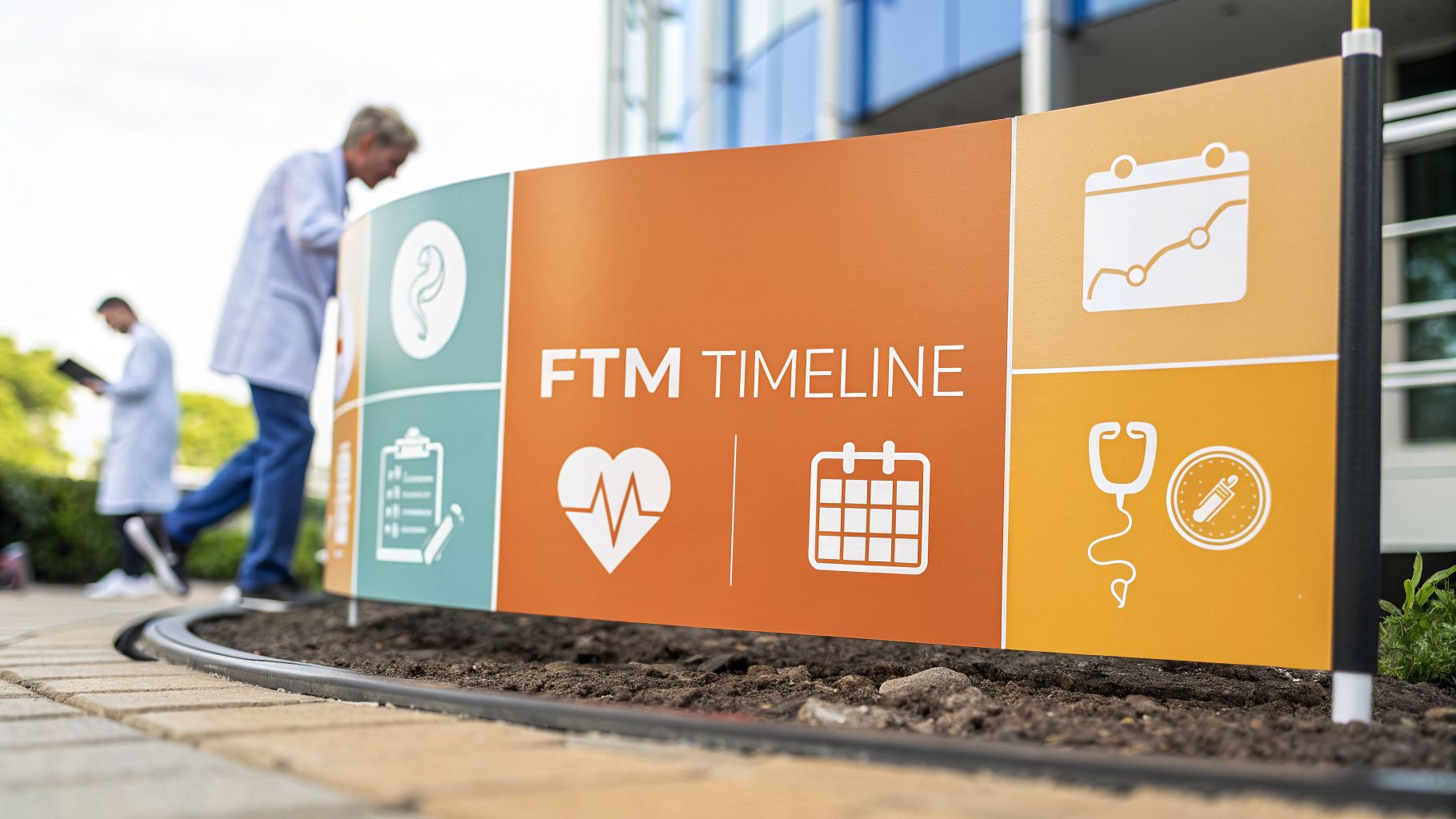How to Increase Testosterone Levels Naturally: Proven Tips
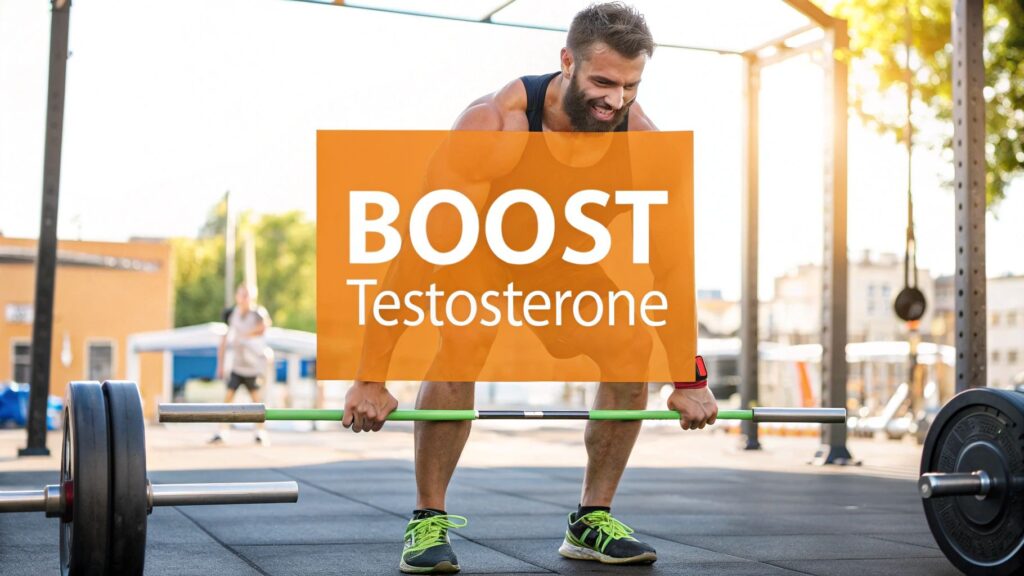
To naturally increase your testosterone, you have to look at the big picture. It’s about building a lifestyle that supports healthy hormone production, focusing on four key areas: resistance training, a nutrient-dense diet, 7-9 hours of quality sleep, and smart stress management.
These four pillars are the foundation. They work together to create the right internal environment for your body to thrive. Forget the quick fixes and magic pills; real, lasting results come from making consistent, strategic changes to your daily habits.
Your Blueprint For Naturally Boosting Testosterone
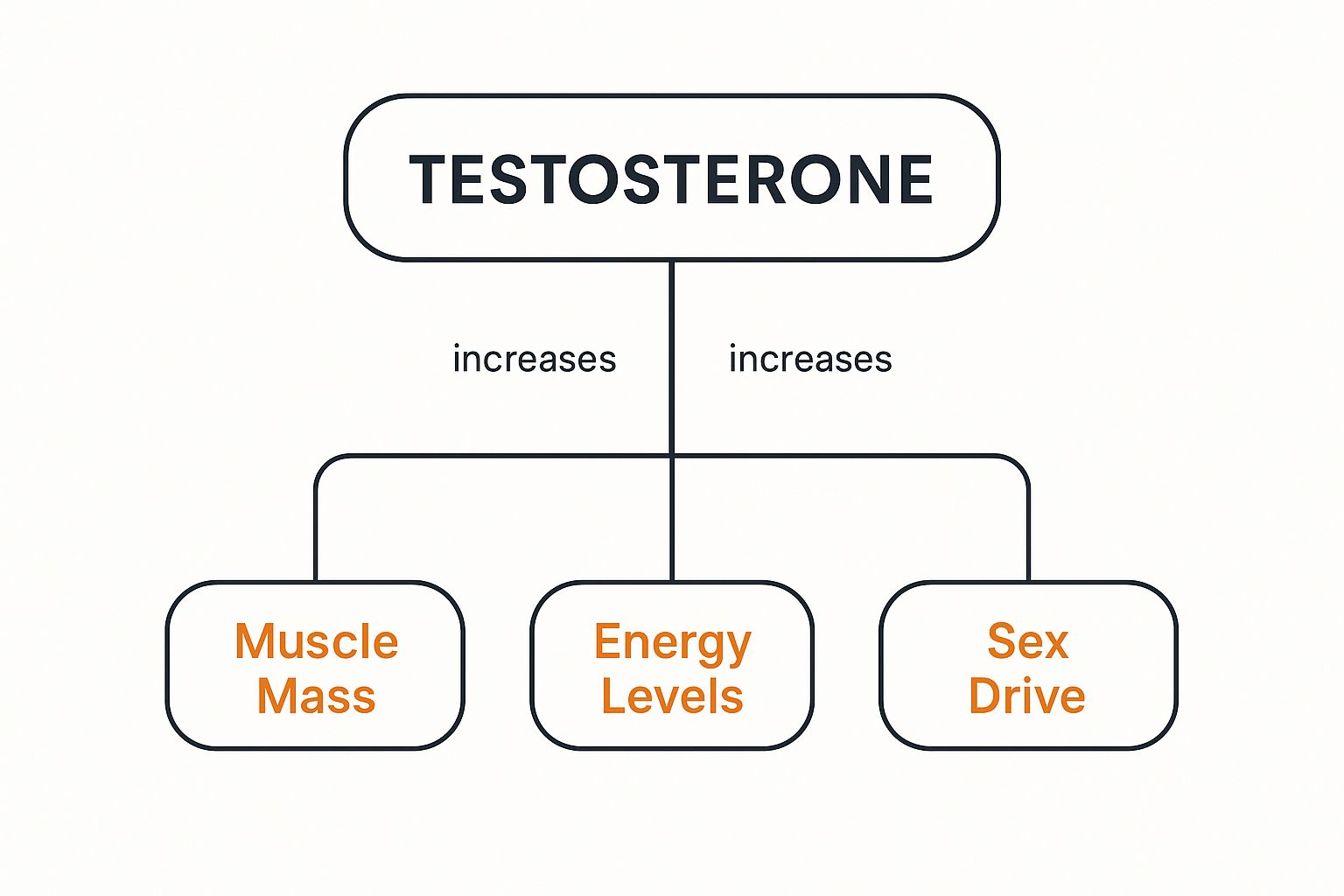
This simple infographic nails the connection between testosterone and the things that matter most for men's health—muscle mass, energy, and sex drive. When you optimize your T-levels, you're directly supporting these vital functions and seriously upgrading your overall quality of life.
The Four Pillars Of Hormonal Health
If you really want to know how to increase testosterone levels naturally, you have to move past the idea of a single solution. True hormonal balance is built on a handful of interconnected lifestyle factors.
Think of it like a four-legged stool—if one leg is short or wobbly, the whole thing becomes unstable. Each one of these pillars directly influences your body's ability to produce and regulate this critical hormone.
The core of this natural approach breaks down into:
- Strategic Nutrition: Giving your body the raw materials it needs. This means essential micronutrients like zinc, magnesium, and vitamin D, plus the healthy fats that are the literal building blocks for testosterone.
- Targeted Exercise: Sending a powerful signal to your endocrine system to ramp up hormone production. Resistance training, in particular, is king here.
- Restorative Sleep: Recognizing that the vast majority of your daily testosterone release happens while you're in deep sleep. This makes quality rest completely non-negotiable.
- Smart Stress Management: Actively working to lower cortisol, the stress hormone. Cortisol and testosterone have an inverse relationship—when one is high, the other is usually suppressed.
The most effective strategies for boosting testosterone aren't found in a bottle; they're built through daily choices. Consistency in diet, training, sleep, and stress reduction creates a powerful synergistic effect that no single supplement can replicate.
To give you a clearer picture, let's summarize how these core areas work together.
Key Pillars For Natural Testosterone Optimization
A summary of the core lifestyle areas that have the most significant impact on natural testosterone production.
| Pillar | Primary Action | Impact on Testosterone |
|---|---|---|
| Diet | Provide essential nutrients like zinc, vitamin D, and healthy fats. | Supplies the raw materials needed for hormone synthesis. |
| Exercise | Engage in regular resistance training and high-intensity workouts. | Stimulates the endocrine system to increase hormone production. |
| Sleep | Achieve 7-9 hours of quality, uninterrupted sleep per night. | The majority of testosterone is produced during deep sleep cycles. |
| Stress | Implement practices like meditation or mindfulness to lower cortisol. | Reduces the suppressive effect of the stress hormone cortisol. |
This table makes it clear that you can't just focus on one area and expect great results. Each pillar supports the others.
Why A Holistic Approach Is Essential
So many guys search for that one workout or magic food that will fix their low T symptoms. But your hormones just don't operate in a vacuum.
You can have a perfect diet, but if you're only sleeping four hours a night, your body is going to struggle to produce enough testosterone. Period.
Likewise, an intense training program can completely backfire if chronic stress keeps your cortisol levels sky-high, effectively canceling out all your hard work in the gym. For a deeper look at the science behind this, you can explore the many secrets to boosting testosterone levels to understand how these elements interact.
This guide is your roadmap. By focusing on these four pillars, you create an environment where your body can naturally get back to doing what it does best. In the sections that follow, we'll dive into actionable, evidence-based strategies for each area, empowering you to take control of your hormonal health with small, sustainable changes that deliver significant results.
Fueling Your Hormones With A Pro-Testosterone Diet
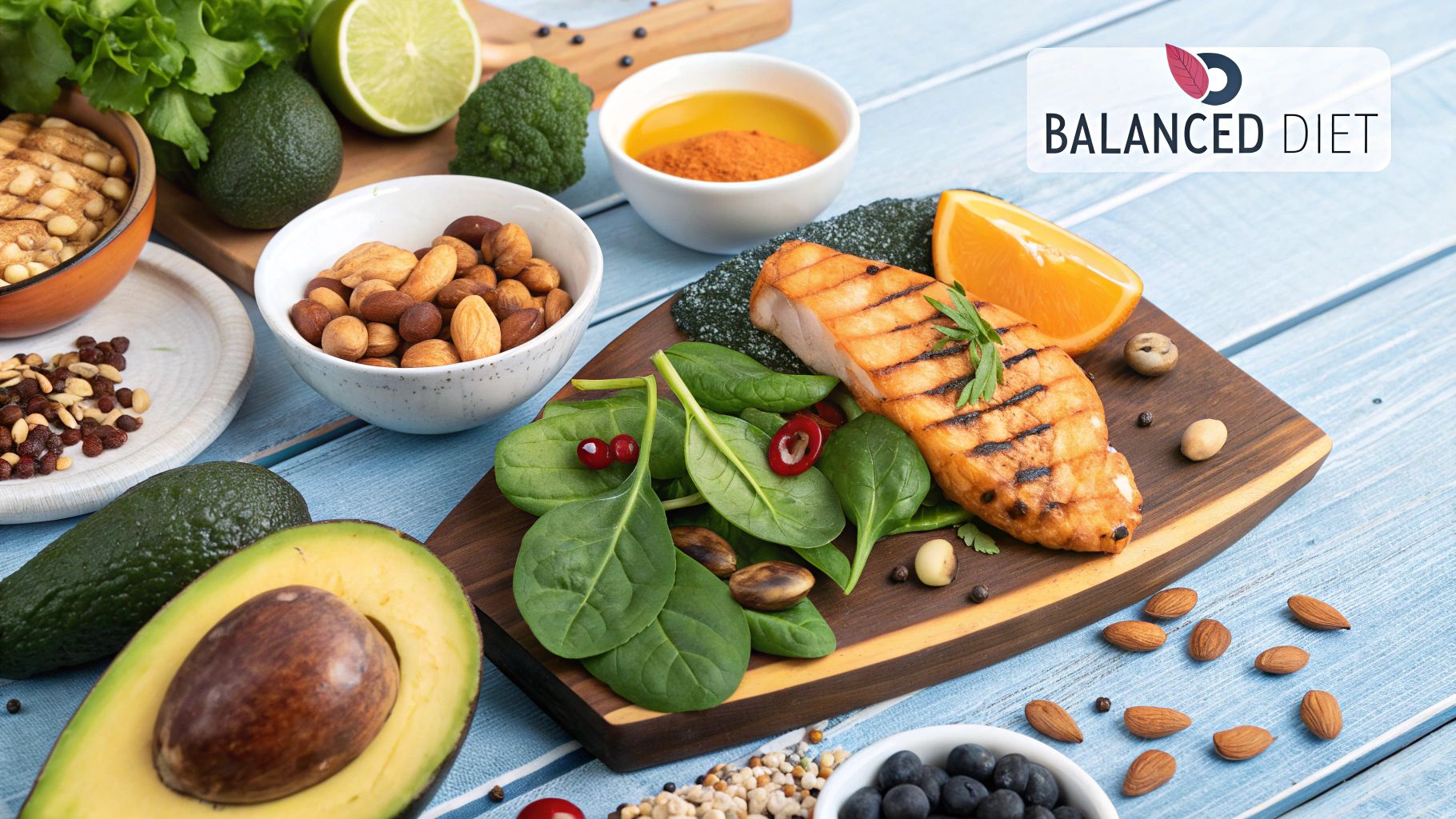
This image of salmon nigiri is a perfect snapshot of a 'pro-testosterone' food.
It’s a fantastic real-world example, combining lean protein with a healthy dose of omega-3s and vitamin D from the fatty fish. In one simple package, it hits multiple nutritional targets your body needs for hormone support.
Your Body Runs On The Fuel You Provide
Let's get one thing straight: the link between what you eat and your hormonal health is direct and powerful. The food on your plate provides the literal building blocks your body needs to manufacture testosterone.
If you don't supply the right raw materials, the production line slows down. It's that simple. This isn't about some vague idea of "eating healthy." It's about a targeted nutritional game plan designed to give your endocrine system exactly what it needs to fire on all cylinders.
The right diet plays a massive role in maintaining and naturally boosting testosterone. Certain foods just outperform others because of their specific nutrient profiles. Nutrients like zinc, magnesium, and vitamin D are absolute all-stars for T-production. Oysters, for example, are packed with zinc, a mineral that’s non-negotiable for hormone synthesis. Fatty fish like salmon and tuna deliver a payload of vitamin D, which acts almost like a hormone itself. For a deeper dive, Vinmec.com offers a great list of testosterone-boosting foods.
The Micronutrient Power Players
While your overall diet is important, a few key micronutrients are the spark plugs for your hormonal engine. Without them, even the best fuel won't get you very far.
Three of the most critical players are:
- Zinc: This mineral is a direct player in the enzymatic reactions that create testosterone. A zinc deficiency is clearly and consistently linked to lower T levels. It’s a foundational element for male hormonal health.
- Magnesium: Often overlooked, magnesium helps free up testosterone that’s bound to proteins in your blood. This makes more of it "bioavailable," meaning your body can actually use it.
- Vitamin D: You've probably heard it called the "sunshine vitamin," but it functions more like a steroid hormone in the body. Research shows a strong, positive link between having adequate vitamin D levels and healthy testosterone.
Getting these key nutrients from whole foods should always be your top priority. Supplements can fill in the gaps, but nothing beats the synergy of vitamins, minerals, and other compounds working together in a well-rounded diet.
Building Your Pro-Testosterone Grocery List
Knowing which nutrients matter is one thing. Turning that knowledge into an actual grocery list you can use is another. Let’s make this simple and actionable. The next time you hit the store, focus on getting these T-supporting foods into your cart.
Focus on Zinc-Rich Foods
- Lean Red Meats: A good steak or some lean ground beef gives you high-quality protein and a serious dose of zinc.
- Shellfish: Oysters are the undisputed king of zinc, but don't sleep on other great options like crab and lobster.
- Legumes: If you're more plant-based, foods like chickpeas, lentils, and beans are solid sources of zinc.
Incorporate Healthy Fats And Vitamin D
- Fatty Fish: Salmon, mackerel, and tuna are loaded with heart-healthy omega-3s and are one of the best food sources of vitamin D you can find.
- Egg Yolks: Don't throw out the yolk! It's a nutritional powerhouse of healthy fats, vitamins, and minerals essential for hormone production.
- Avocados and Olive Oil: These deliver the monounsaturated fats that are crucial for maintaining overall hormonal balance.
Balancing Your Macronutrients
Your body needs a healthy mix of protein, fats, and carbohydrates to function at its best. Any extreme diet that severely restricts one of these can send a major stress signal to your body, which often responds by shutting down "non-essential" functions like robust hormone production.
Chronically low-calorie or low-fat diets can be especially damaging. Your body interprets this as a state of famine and goes into conservation mode, which includes dialing back testosterone output to save energy.
To support your goals, aim for a balanced plate at every meal. A great real-world example? A dinner of grilled salmon (protein, healthy fats, vitamin D), a side of roasted sweet potatoes (complex carbs), and a big spinach salad with an olive oil vinaigrette (more healthy fats and magnesium). That single meal delivers a huge array of the nutrients your body needs to optimize hormone production naturally.
Training Smarter To Build Muscle And Boost Testosterone
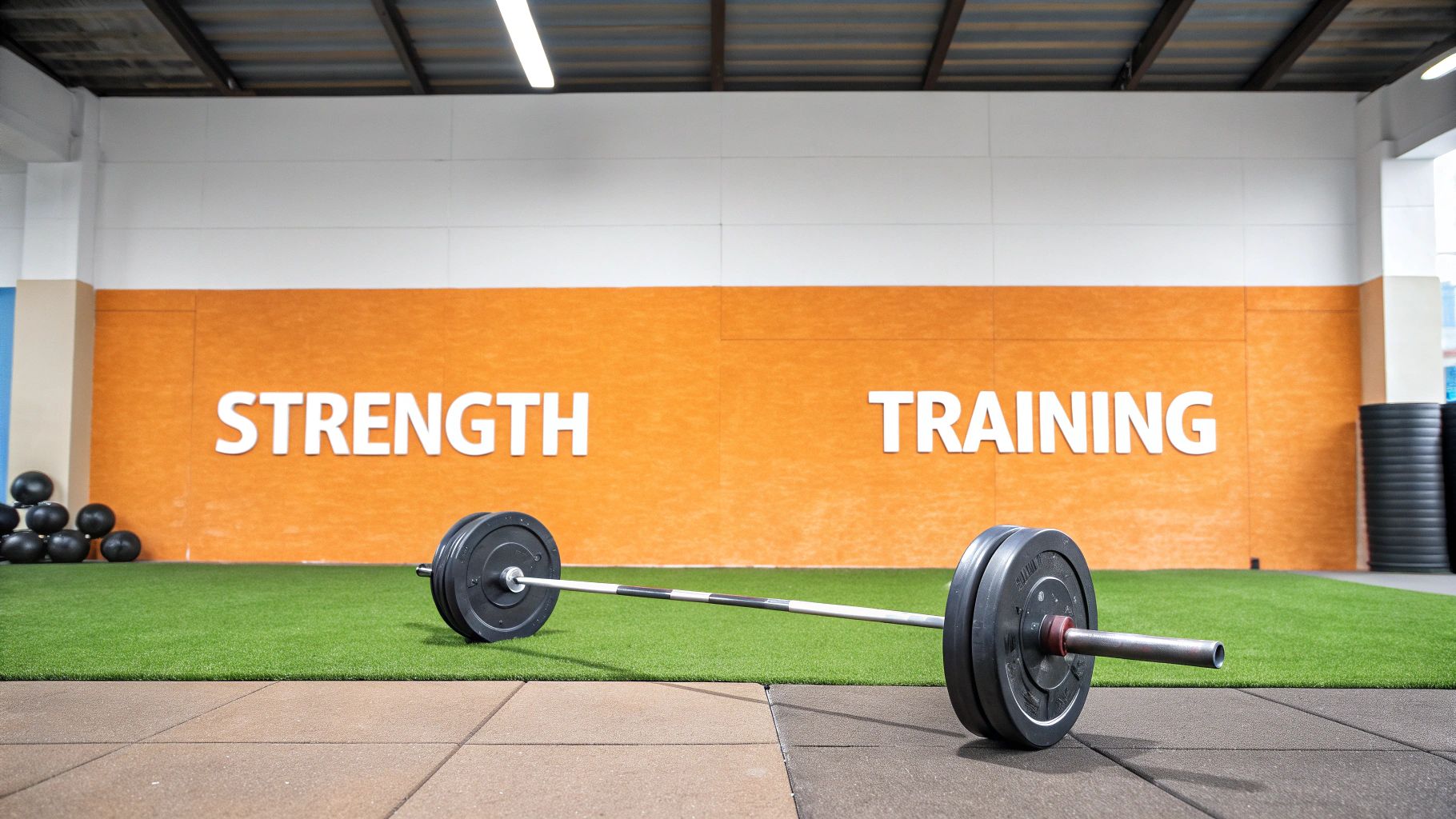
Physical activity is more than just burning calories; it's a direct conversation with your endocrine system. The right kind of exercise sends a powerful signal to your body to ramp up testosterone production, making it one of the most effective natural tools you have.
This isn't about spending endless hours at the gym grinding yourself into dust. It’s about training with purpose and focusing on the specific movements that trigger the biggest hormonal response.
Prioritize Resistance Training
If you had to pick just one type of exercise for testosterone support, it should be resistance training. Lifting heavy things, especially with challenging loads, creates the perfect hormonal storm for optimization.
Study after study shows that physically active men have higher levels of key hormones, including testosterone, than their sedentary peers. Strength training, in particular, consistently comes out on top as the most effective method.
The trick is to focus on the movements that give you the most bang for your buck.
Compound Movements Are King
Not all lifts are created equal when it comes to hormonal impact. The real magic happens with compound movements—exercises that recruit multiple large muscle groups all at once. We're talking about the classics: squats, deadlifts, bench presses, and overhead presses.
These big, demanding lifts place a massive metabolic stress on your entire body. This forces your central nervous system and endocrine system to respond by unleashing a cascade of anabolic hormones, including testosterone, to help you repair and grow stronger.
A smart workout split might look something like this:
- Day 1 (Lower Body Focus): Barbell Squats, Romanian Deadlifts, Leg Press, Calf Raises.
- Day 2 (Upper Body Focus): Bench Press, Bent-Over Rows, Overhead Press, Pull-Ups.
- Day 3 (Full Body): Deadlifts, Incline Dumbbell Press, Dumbbell Lunges, Seated Cable Rows.
This approach ensures you’re hitting the largest muscles in your body on a regular basis, which maximizes that hormonal signal. The goal here is progressive overload—always pushing to gradually increase the weight or reps over time to keep challenging your body. For a deeper dive into how this all works, understanding the relationship between TRT and muscle gain sheds light on the powerful role testosterone plays in building raw strength.
Incorporate High-Intensity Interval Training
While lifting should be your foundation, High-Intensity Interval Training (HIIT) is the perfect wingman. HIIT involves short, all-out bursts of effort followed by brief recovery periods.
This style of training is incredibly efficient at improving body composition by burning fat while preserving precious muscle—a crucial factor for hormonal health. Excess body fat is linked to higher estrogen and lower testosterone, so keeping it in check is key.
A simple HIIT session could be:
- Warm up for 5 minutes.
- Sprint on a stationary bike for 30 seconds at absolute maximum effort.
- Recover with 60 seconds of easy pedaling.
- Repeat this cycle for 10-15 minutes.
- Cool down for 5 minutes.
You only need to sprinkle HIIT into your routine two or three times a week to get the benefits. It's a time-savvy way to fire up your metabolism and support your hard work in the weight room.
Your training program should stimulate, not annihilate. The goal is to trigger an adaptive response, not to push your body into a state of chronic stress that works against your hormonal goals.
The Dangers Of Overtraining
More is not always better. One of the biggest mistakes guys make is pushing too hard, too often, without giving themselves enough time to recover. This is overtraining, and it’s a testosterone killer.
When you overtrain, your body is in a constant state of breakdown. This skyrockets your levels of cortisol, the primary stress hormone. Cortisol and testosterone have an inverse relationship; when cortisol is chronically jacked up, testosterone levels plummet.
Listen to your body. The signs of overtraining are hard to miss:
- Persistent muscle soreness and deep fatigue.
- A noticeable decline in your performance or strength.
- Feeling irritable and sleeping poorly.
- A total lack of motivation to even go to the gym.
If these symptoms sound familiar, it's a clear signal to take an extra rest day or two. Recovery is when the real growth happens—when your muscles rebuild and your hormones recalibrate. Prioritizing rest is just as important as the work you put in at the gym.
Mastering Sleep And Stress For Hormonal Balance

While diet and exercise usually steal the spotlight, two of the most powerful levers for your hormonal health work quietly behind the scenes. If you're serious about naturally increasing testosterone, mastering your sleep and managing stress are completely non-negotiable.
Think of it like this: a perfect diet gives you the raw materials and a smart training plan creates the stimulus for growth. But sleep? That’s when your body actually does the construction work. It's during those deep, restorative hours that your endocrine system is running at full steam.
Prioritize Your Sleep For Optimal Production
Sleep isn't just downtime; it's a critical restorative state. For your hormones, it’s when the magic happens. Your body uses this time to repair tissue, consolidate memories, and—most importantly—produce key hormones like testosterone.
Research is crystal clear that the majority of your daily testosterone is released during deep sleep. When you consistently cut your sleep short, you're directly pulling the plug on this vital production cycle. In fact, just one week of sleeping only five hours a night was shown to slash daytime testosterone levels by 10-15% in healthy young men.
Lifestyle changes are some of the most accessible and effective ways to support your hormones. Experts point out that right alongside weight management and resistance training, solid sleep hygiene is proven to elevate testosterone production. Since about 60% of your daily testosterone release happens while you sleep, making quality rest a priority is a total game-changer. Find out more about how lifestyle changes can boost your T-levels.
Building A Better Sleep Environment
Here’s the thing: you can't try harder to fall asleep. It doesn't work that way. What you can do is create an environment that practically invites rest. This is what we call building good sleep hygiene.
Here are a few high-impact changes you can make tonight:
- Keep It Cool: Your body temperature has to drop to initiate deep sleep. Aim for a room temperature somewhere between 60-67°F (15-19°C).
- Embrace The Dark: Light is a powerful signal to your brain that it's time to be awake. Use blackout curtains, tape over electronics, or wear an eye mask to make your room pitch black.
- Eliminate Blue Light: The blue light from your phone, tablet, and TV is especially good at wrecking your production of melatonin—the hormone that governs your sleep-wake cycle. Power down all screens at least an hour before you plan to hit the hay.
Think of your bedroom as a cave: it should be cool, dark, and quiet. This primal environment signals safety and rest to your brain, setting the stage for deep, restorative sleep and optimal hormone production.
The Cortisol-Testosterone Seesaw
Just as quality sleep is testosterone's best friend, chronic stress is its worst enemy. When you're constantly frazzled, your adrenal glands go into overdrive, pumping out a hormone called cortisol.
Cortisol and testosterone have an inverse relationship, almost like a seesaw. When cortisol levels are high, testosterone levels tend to get pushed down. This makes perfect sense from an evolutionary standpoint. In a "fight or flight" situation, your body prioritizes immediate survival over long-term functions like building muscle or reproduction.
The problem is, modern life can trigger this stress response constantly—from work deadlines and financial worries to just being stuck in traffic. This state of chronic stress keeps your cortisol elevated, effectively putting a ceiling on your testosterone production.
Actionable Stress Management Techniques
Managing stress isn't about eliminating it completely—that's just not realistic. It’s about building a toolkit to control your response to it, stopping cortisol from running the show.
Here are a few simple but powerful practices you can work into your daily routine:
- Mindful Breathing: When you feel stress creeping in, just stop for five minutes and focus on your breath. Inhale slowly for a count of four, hold for four, and exhale slowly for a count of six. This simple act can calm your entire nervous system and lower cortisol right in the moment.
- Get Outside: Spending just 20 minutes in nature can significantly lower stress hormone levels. A quick walk in a park on your lunch break is a fantastic way to hit the reset button.
- Journaling: Get your thoughts out of your head and onto paper. Writing down your worries for a few minutes before bed, often called a "brain dump," can prevent anxious thoughts from sabotaging your sleep.
By actively managing your stress, you aren't just improving your mental well-being; you are directly creating a more favorable hormonal environment. These small, consistent habits help lower the cortisol side of the seesaw, allowing your testosterone levels to rise naturally.
Using Supplements Wisely For Testosterone Support
Let's be clear: supplements are not the foundation of hormonal health. Think of them as the support crew, not the main act. The real heavy lifting comes from your diet, training, sleep, and stress management.
Once that foundation is solid, however, the right supplements can give you a valuable edge. The key is to see them as strategic tools to fill nutritional gaps or support your body's natural hormone factory, not as a shortcut to bypass the hard work.
The market is an absolute minefield of overhyped products and slick marketing. To avoid throwing your money away, you have to focus on ingredients with real science behind them. The goal here is to make smart, informed choices that amplify your lifestyle efforts.
Key Evidence-Backed Supplements
If you want to cut through the noise, you need to know what actually works. A handful of vitamins, minerals, and herbs have consistently shown real promise in clinical studies for supporting healthy testosterone levels.
Let's break down some of the most well-researched options that can give you a legitimate boost.
- Vitamin D3: Often called the "sunshine vitamin," this one functions more like a steroid hormone in the body. The research is pretty conclusive: there's a strong link between healthy Vitamin D levels and higher testosterone. If you don't get consistent, strong sun exposure year-round, supplementation is a no-brainer.
- Zinc: This is a frontline player. Zinc is a critical mineral directly involved in the production of testosterone. A deficiency is a fast track to low T levels, making this a foundational supplement, especially if you train hard and lose zinc through sweat.
- Magnesium: This mineral is all about making the testosterone you do have more effective. It helps increase your "free" testosterone—the active, unbound form—by preventing it from getting locked up by a protein called SHBG. More free T means more of it is available for your body to actually use.
Before you start loading up on supplements, it’s always a good idea to talk to a healthcare professional. They can run blood work to see if you have any actual deficiencies and help you dial in safe, effective dosages.
Adaptogens and Amino Acids
Beyond the core vitamins and minerals, a few other compounds have shown they can pack a punch, often by helping your body manage stress or by acting as important signaling molecules.
Ashwagandha is one of the most promising adaptogens out there. The science backs it up, too. In one study, resistance-trained men taking 600 mg of Ashwagandha daily for eight weeks saw significant increases in both testosterone and muscle strength compared to the placebo group. In other trials involving men with low sperm counts, it boosted testosterone by 15% to 17% over several weeks. You can find more science-backed ways to naturally increase testosterone on InsideTracker.com.
Another popular one is D-Aspartic Acid (DAA). This amino acid is involved in the central nervous system and plays a role in signaling the testes to produce more testosterone. Some studies suggest it can be effective, but the results seem to be most significant for sedentary men or those with low T to begin with. For guys who are already active and healthy, the effects can be mixed.
When you're buying supplements, quality is everything. Don't cheap out. Look for reputable brands that use third-party testing to prove what's on the label is actually in the bottle. By sticking to these evidence-backed options, you can make smarter, safer choices that truly complement your core lifestyle strategies.
Common Questions About Increasing Testosterone Naturally
Navigating the world of hormone optimization is bound to bring up a few questions. As you start cleaning up your diet, hitting the gym, and dialing in your lifestyle, it's totally normal to wonder what to expect and which habits really move the needle.
Let's cut through the noise and get you some clear, straightforward answers to the most common concerns.
How Long Does It Take To See An Increase In Testosterone Levels Naturally?
This is the big one, the question everyone asks right out of the gate. And the honest-to-goodness answer is: it depends. Your results are tied to your starting point, your age, and most importantly, how consistent you are with the strategies we've talked about.
You'll almost certainly feel the changes before you can measure them. Within just a few weeks of eating better and truly prioritizing sleep, you'll likely notice more energy, a better mood, and sharper focus. These are the first green shoots—signs that you're on the right track.
When it comes to measurable changes confirmed by a blood test, you need to be a bit more patient. With a solid resistance training program and a nutrient-packed diet, you could see a real hormonal shift within 8-12 weeks. Think of this as a long-term investment. For the most meaningful and lasting impact, give it a solid 3-6 months of consistent effort.
Are There Any Everyday Habits That Secretly Lower Testosterone?
You bet. Sometimes, what you stop doing is just as powerful as what you start doing. A handful of common habits can quietly drain your testosterone without you ever realizing it.
Here are some of the worst offenders:
- Chronic Alcohol Use: Regular, heavy drinking is a direct hit to the cells in your testes that produce testosterone. It’s a major hormonal disruptor.
- A Diet Full of Processed Junk: Foods loaded with sugar and bad fats crank up inflammation and fat gain, both of which are notorious for tanking testosterone.
- Skimping on Sleep: Like we covered, your body does most of its testosterone production overnight. Routinely getting less than seven hours is like keeping the hormone factory shuttered.
- Living a Sedentary Life: This doesn't just lead to weight gain; it robs your body of the powerful physical kickstart that exercise gives your entire hormonal system.
Cutting these out is just as important as adding in the good stuff. For a deeper dive into these pitfalls and more, check out our complete guide on how to increase testosterone naturally.
Can I Increase My Testosterone Levels With Diet Alone?
While your diet is a massive piece of the puzzle, it's pretty unlikely to trigger a huge increase all by itself, especially if other parts of your life are out of whack. A great diet provides the raw materials, but it needs a team to get the job done.
Here’s an analogy: think of your diet as delivering all the best bricks and mortar to a construction site. That’s essential, but resistance training is the construction crew that provides the powerful stimulus for your body to actually use those materials and build testosterone.
By the same token, even the most perfect, nutrient-rich diet in the world can't win a fight against the hormonal damage caused by chronic stress or terrible sleep. To get the best results possible, you need a holistic approach where all the key pillars are working together in harmony.
At Elite Bioscience, we provide the tools to support your journey toward optimal health. Our tailored therapies are designed to complement your lifestyle efforts, helping you regain vitality and perform at your best. Explore our treatment options and take the next step in taking control of your well-being.
QUICK SEARCH
Make an account today to start your journey towards a better and healthier lifestyle.
